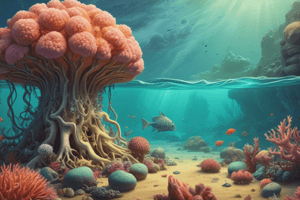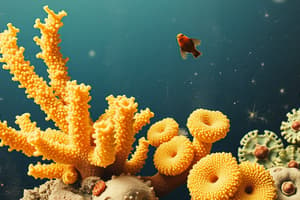Podcast
Questions and Answers
What are the three classes of the Phylum Porifera?
What are the three classes of the Phylum Porifera?
Calcarea, Hexactinellida, Demospongiae
What organisms belong to the Class Calcarea?
What organisms belong to the Class Calcarea?
Sycon, Leucoselenia
What organisms belong to the class Hexactinellida?
What organisms belong to the class Hexactinellida?
Euplectella
Describe the asconoid type of canal system.
Describe the asconoid type of canal system.
Describe the Syconoid type of canal system.
Describe the Syconoid type of canal system.
Where do the choanocytes reside in the Syconoid canal system?
Where do the choanocytes reside in the Syconoid canal system?
Where do the choanocytes line in the asconoid canal system?
Where do the choanocytes line in the asconoid canal system?
Where do the choanocytes reside in the Leuconoid canal system?
Where do the choanocytes reside in the Leuconoid canal system?
What are amphiblastula larvae and in what organisms do they appear?
What are amphiblastula larvae and in what organisms do they appear?
What is the distinguishing feature of Euplectella?
What is the distinguishing feature of Euplectella?
Where are spongin fibers commonly found?
Where are spongin fibers commonly found?
What organism is this? (scypha/sycon)
What organism is this? (scypha/sycon)
What class does this organism belong to? (Calcarea)
What class does this organism belong to? (Calcarea)
What sponge is this? (Euplectella)
What sponge is this? (Euplectella)
What is the taxonomy for Sycon?
What is the taxonomy for Sycon?
What is the taxonomy for Leucosolenia?
What is the taxonomy for Leucosolenia?
What is the taxonomy for Euplectella?
What is the taxonomy for Euplectella?
What organism is this? (leucosolenia)
What organism is this? (leucosolenia)
What organism is this? (sycon)
What organism is this? (sycon)
What organism is this? (sycon or scypha)
What organism is this? (sycon or scypha)
What are the 3 types of spicules?
What are the 3 types of spicules?
What kind of spicules do Class Calcarea have?
What kind of spicules do Class Calcarea have?
What kind of spicules do Class Hexactinellida have?
What kind of spicules do Class Hexactinellida have?
What kind of spicules do Demospongiae have?
What kind of spicules do Demospongiae have?
Flashcards are hidden until you start studying
Study Notes
Classes of Phylum Porifera
- Three classes: Calcarea, Hexactinellida, and Demospongiae.
Organisms in Calcarea
- Examples include Sycon and Leucosolenia.
Organisms in Hexactinellida
- Example organism: Euplectella.
Asconoid Canal System
- Water enters through dermal pores, flows into the atrium.
- Choanocyte flagella create a current, expelling water through the osculum.
Syconoid Canal System
- Water flows into incurrent canals via dermal ostium, through prosopyles.
- Exits via apopyles into the excurrent canal leading to the spongocoel and out through the ostium.
Choanocyte Location in Canal Systems
- In the Syconoid canal system, choanocytes reside in radial canals.
- In the Asconoid system, choanocytes line the spongocoel.
- In the Leuconoid system, choanocytes are found in distinct 'flagellated' chambers.
Amphiblastula Larvae
- Amphiblastula larvae appear in the radial canals of Scyconoids.
Distinguishing Feature of Euplectella
- Euplectella is known for its glassy appearance.
Location of Spongin Fibers
- Spongin fibers are commonly found in Demospongiae.
Taxonomy of Sycon
- Phylum Porifera, Class Calcarea.
Taxonomy of Leucosolenia
- Phylum Porifera, Class Calcarea.
Taxonomy of Euplectella
- Phylum Porifera, Class Hexactinellida.
Identifications
- Leucosolenia is a notable organism in Calcarea.
- Sycon (or Scypha) refers to organisms in Calcarea.
Types of Spicules
- Three types: Calcareous, Silicous, and Spongin.
Spicule Composition by Class
- Class Calcarea has calcareous spicules.
- Class Hexactinellida features silicous spicules.
- Class Demospongiae is characterized by spongin fibers.
Studying That Suits You
Use AI to generate personalized quizzes and flashcards to suit your learning preferences.




